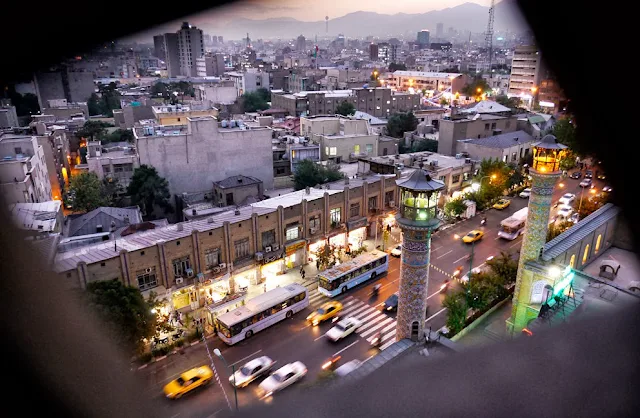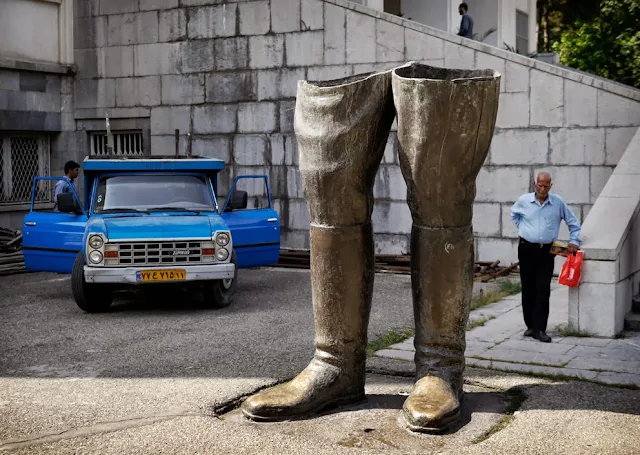Azadi
("Freedom") Tower, the gateway to Tehran designed in 1966 by Hossein
Amanat. He now lives in Canada. Image by Amos Chapple.
Did you know that Iranians are basketball fanatics? Did you know that their teams contain a healthy contingent of American athletes? Or that no one wears hijab on the ski lifts? Did you know that Mullahs can have a fashion sense? Or that their sons can be popular rappers wearing "the leaf" emblazoned on their clothes? Have you ever seen the utter beauty of an Iranian wedding?
Come, visit Iran with Mozhgan Hudiburgh and learn more about this lovely country.
Did you know that Iranians are basketball fanatics? Did you know that their teams contain a healthy contingent of American athletes? Or that no one wears hijab on the ski lifts? Did you know that Mullahs can have a fashion sense? Or that their sons can be popular rappers wearing "the leaf" emblazoned on their clothes? Have you ever seen the utter beauty of an Iranian wedding?
Come, visit Iran with Mozhgan Hudiburgh and learn more about this lovely country.
This film is worth the time to watch. Grab a cuppa, get comfy, and enjoy this fast-paced introduction to the beauty that is Iran. Mozhgan is about to take you on a most enjoyable tour of this greatly misrepresented country.
While I am at it, let me recommend also PRESS TV the Iranian station. The link is posted to the right. There are a few delights watching Iranian news. No advertisements is a huge draw! The interviews and specials are quite fascinating and the news is always very balanced, not at all what one might think. The talking heads actually talk without giggling inanely every three seconds and the interviews always interesting, the debates riveting.
IMAGES OF IRAN:
Now for some photos taken about 5 years ago by a traveller, Amos Chapple, to Iran. I have edited his commentary because his politics were not appropriate for this blog, but his images are.
 A shepherd
leads his flock out to pasture in the mountains on the Iran/Iraq border.
A shepherd
leads his flock out to pasture in the mountains on the Iran/Iraq border.
A man in
southern Tehran, the working class region of the city. In the past 14 months,
tightened sanctions have nearly halved the value of Iran's currency and fuelled
soaring inflation
.
View of
central Tehran from inside a minaret in Sepahsalar Mosque.
.
A young worker
walks through the light of a stained glass window in the Tehran Bazaar.
Twins on the
Tehran Metro.
.
In Tehran, a
collection of modern art valued at $2.5billion is held by the Museum of
Contemporary Art. In a little-publicised exhibition in 2011 the works, including
pieces by Warhol (pictured), Pollock, Munch, Hockney and Rothko were put on
display for the first time since 1979 when the owner of the art, Queen Farah
Pahlavi fled Iran with her husband, the late Shah of Iran.
.
At the
Sa'adabad Palace complex in northern Tehran, Islamic revolutionaries sawed a
statue of the deposed Shah in half. Today schoolchildren are taken on group
visits past the boots and into the palace to see the decadence of the former
Shah's living quarters.
.
Women in the
hills above Tehran at dusk. Concealing clothing in the Islamic Republic,
including head coverings, is mandatory for women, but the exact definition of
"modest" is flexible, leading to a tug of war between young females
and the authorities each spring.
.
Two soldiers
being attacked inside the Tehran metro after an argument. The soldier was
punched in the head at least four times by an angry crowd of mostly
well-dressed young men. Both soldiers were forced to leave the metro at the
next station.
.
A Kurdish man
settles in for a night of guarding some roadworking machinery in the mountains
near the Iran/Iraq border. The border is rife with smugglers who carry alcohol
from Iraq (where alcohol is legal) into the villages on the Iranian side. From
there it is transported by vehicle to the cities. In Tehran a can of beer on
the black market fetches around $10USD
.
A group of
friends in the hills above Tehran. Zac Clayton, a British cyclist who will
finish a round-the-world cycle on March 23 describes Iran as having the kindest
people of any country he cycled through.
.
A mural
painted on the wall of the former American embassy in Tehran. Murals such as
this are at odds with statistics showing that, despite American sanctions, and
the American-led coup against a elected and popular prime minister, more
Iranians feel positively about America than do Turks or Indians.
.
A worker inside Vakil Mosque, Shiraz.
The mosque now serves as a tourist attraction but sees only a trickle of
visitors. Although tourism is on the increase, western tourists still make up
only 10% of the total.
Detail
of Persepolis, the seat of the Ancient Persian Empire. The Arab conquest of
Persia led to an islamification of Iran but Farsi, the Iranian language, has
remained alive. The 11th century poet Ferdowsi, described as "Iran's
Homer", wrote an epic in Farsi which was carefully crafted with minimal
Arabic influence. The "Book of Kings" has been credited with helping
preserve the Farsi language ~ one of the world's oldest. The Book of Kings ends
with the Arab invasion, depicted as a disaster for Persia.
.
Detail
of Persepolis. After the Islamic Revolution, hardline clerics called for the
destruction of the site, but official unease prevailed. "They realized
this would unite the people against them" says an English teacher named
Ali, quoted in National Geographic.
.
A
commemorative plate of the former Shah of Iran in an antique store in Shiraz.
The Shah was installed in power by a MI6 and CIA-backed coup after Prime
Minister Mosaddeq nationalized the petroleum industry of Iran, thus shutting
out British dominance of an industry they had controlled since 1913. That
Mosaddeq had been a democratically-elected leader, with wide popular support
fuelled resentment at western powers, and the Shah, who many saw as a brutal
puppet for the west. The anger at western intervention helped stoke support for
the anti-western Ayatollah Khomeini.
.
Palangan Village, in the mountains near the Iraq
border. Palangan, illustrative of many of the country's rural settlements, has
benefitted handsomely from government support. Many villagers are employed in a
nearby fish farm, or are paid members of the Basij, whose remit includes
prevention of "westoxification", and the preservation of everything
the 1979 Islamic revolution and its leader the Ayatollah Khomeini stood for,
including strict rules on female clothing and male/female interaction.

















No comments:
Post a Comment
If your comment is not posted, it was deemed offensive.